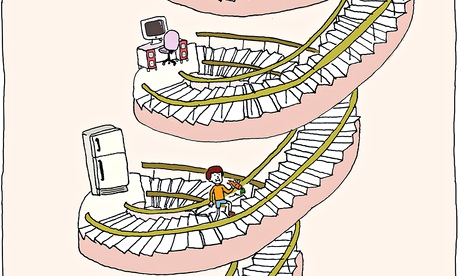
First, this week, an astoundingly effective tip for developing beneficial habits, such as eating plenty of vegetables, flossing your teeth, keeping your desk tidy, phoning your mother or unfriending people who post self-written poetry on Facebook. Ready? Here's the tip: just do those things. You know – as opposed to not doing them. I'm aware this may strike some readers as relatively unastounding, perhaps even infuriatingly useless. Still, that's one way of interpreting the underlying message of a popular – and not useless – new ebook, by the blogger SJ Scott, entitled Habit Stacking.
Much literature on habit change presents it as an arduous matter of personality transformation: somehow, and probably over months, you have to turn yourself into the kind of person to whom better habits come naturally. But in certain contexts, might that be a case of overcomplicating something that's actually pretty simple?
The basic concept behind Scott's (very short) book is an old one in psychology – "habit chaining". The idea is to pick something you have no problem motivating yourself to do – brushing your teeth is the classic example – then link to it some habit you want to acquire: applying sunscreen, say. Habit stacking is just the nuclear-powered version. Make a list of small habits that take no more than five minutes each and 30 minutes in total, Scott advises. (Though those numbers are somewhat arbitrary, of course; tweak to suit your life.)
Then you'll need to remember, and find motivation for, only one new piece of behaviour: to rattle through the checklist once a day. It's probably worth warning any housemates that the resulting jumble of activities is going to seem pretty eccentric, as you suddenly rise from the dining room table to drink a glass of water, eat one of your five-a-day vegetables, text a friend, answer one long-neglected email, meditate for five minutes, pick one item of clutter to recycle, do 10 press-ups and wipe down the kitchen counter, to name several of Scott's 90+ suggestions. On the upside, you'll have them all out of the way.
There's a point behind this seemingly very obvious trick, which is that one of the biggest obstacles to acting the way we'd like isn't a question of personality change, but just of remembering what to do. That's why surgeons are increasingly encouraged to follow pre-set checklists during operations, even though some resist it, convinced that their experienced brains – they're surgeons, for God's sake! – are superior to any list. (In fact, following such a list has been shown to cut surgery deaths by 40%.) Most of us have a dose of that doctorly arrogance when it comes to our capacity to remember. But how many useful activities in life go neglected, not because we lack the time or can't muster the energy to do them, but simply because we forgot they were an option at all?
Habit stacking isn't an approach I'd want to adopt for much more than the recommended half an hour a day: running through the checklist, I can report, feels robotic and dutiful, and not much fun. On the other hand, by 8am daily, I'd finished eight or nine things that would otherwise have nagged at me for the rest of the day. Sometimes, the secret of inculcating better habits is to forget all that inculcating business, and just do them.
oliver.burkeman@theguardian.com
Follow Oliver on Twitter

